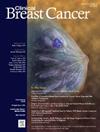Overweight and Risk of Recurrence Following Neoadjuvant Chemotherapy in Breast Cancer
IF 2.5
3区 医学
Q2 ONCOLOGY
引用次数: 0
Abstract
Background
Having overweight is increasingly recognized as a risk factor for poor breast cancer (BC) outcomes. Previous studies have linked high body mass index (BMI) to an increased risk of recurrence and higher mortality. While most research has focused on patients treated with adjuvant chemotherapy, this study examines the impact of overweight on recurrence-free survival (RFS) in BC patients treated with neoadjuvant chemotherapy (NACT).
Materials and methods
This study included 490 Swedish BC patients who completed NACT between 2005 and 2019. During a follow-up period averaging 5 years, 116 patients (24%) experienced recurrences at any location. The association between overweight (BMI ≥ 25 kg/m2) at BC diagnosis and RFS was analysed using univariable and multivariable Cox regression models.
Results
The majority of patients (56%, 275/490) were classified as overweight. Patients with overweight tended to present with slightly more advanced disease stages and were more likely to have ER-/HER2- BC. Multivariable Cox regression analysis, adjusted for age and menopausal status, revealed that patients with overweight had a 47% higher hazard of recurrence compared to patients without overweight (hazard ratio [HR] 1.47, 95% CI 1.01-2.15). Subgroup analysis showed the largest relative effect in the ER+/HER2+ subgroup. Notably, the association between overweight and recurrence appeared independent of whether pathological complete response was achieved.
Conclusions
Overweight was associated with a higher risk of recurrence following NACT. Future research should explore whether BC prognosis can be improved by addressing modifiable factors that may mediate the impact of overweight on recurrence.
乳腺癌新辅助化疗后超重与复发风险
背景:超重越来越被认为是乳腺癌预后不良的一个危险因素。先前的研究表明,高体重指数(BMI)与复发风险增加和死亡率升高有关。虽然大多数研究都集中在接受辅助化疗的患者身上,但本研究探讨了超重对接受新辅助化疗(NACT)的BC患者无复发生存(RFS)的影响。材料和方法:本研究纳入了2005年至2019年期间完成NACT的490名瑞典BC患者。在平均5年的随访期间,116名患者(24%)在任何部位复发。采用单变量和多变量Cox回归模型分析BC诊断时体重超重(BMI≥25 kg/m2)与RFS之间的关系。结果:大多数患者(56%,275/490)属于超重。超重的患者往往呈现出更晚期的疾病阶段,更有可能有ER-/HER2- BC。多变量Cox回归分析,调整了年龄和绝经状态,结果显示超重患者的复发风险比未超重患者高47%(风险比[HR] 1.47, 95% CI 1.01-2.15)。亚组分析显示,ER+/HER2+亚组的相对影响最大。值得注意的是,超重和复发之间的关系似乎与是否达到病理完全缓解无关。结论:超重与NACT术后较高的复发风险相关。未来的研究应探讨是否可以通过解决可能介导超重对复发影响的可变因素来改善BC预后。
本文章由计算机程序翻译,如有差异,请以英文原文为准。
求助全文
约1分钟内获得全文
求助全文
来源期刊

Clinical breast cancer
医学-肿瘤学
CiteScore
5.40
自引率
3.20%
发文量
174
审稿时长
48 days
期刊介绍:
Clinical Breast Cancer is a peer-reviewed bimonthly journal that publishes original articles describing various aspects of clinical and translational research of breast cancer. Clinical Breast Cancer is devoted to articles on detection, diagnosis, prevention, and treatment of breast cancer. The main emphasis is on recent scientific developments in all areas related to breast cancer. Specific areas of interest include clinical research reports from various therapeutic modalities, cancer genetics, drug sensitivity and resistance, novel imaging, tumor genomics, biomarkers, and chemoprevention strategies.
 求助内容:
求助内容: 应助结果提醒方式:
应助结果提醒方式:


